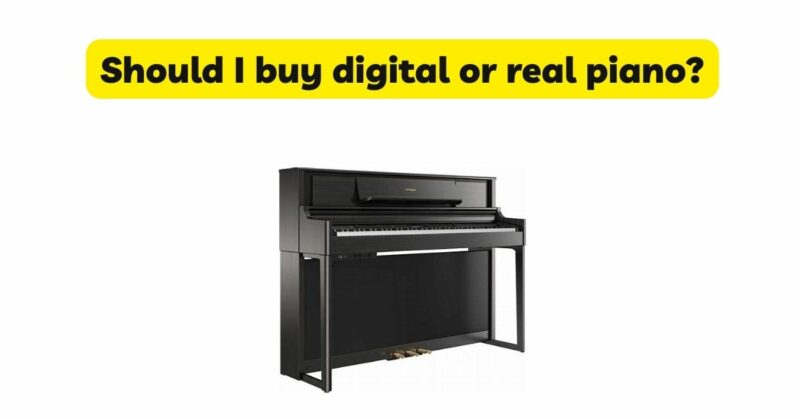The decision to buy a piano is an exciting and important one for aspiring musicians, professionals, and enthusiasts alike. However, choosing between a digital piano and a real piano can be a challenging task, as both options have their own unique advantages and considerations. In this article, we will explore the factors to consider when deciding whether to purchase a digital piano or a real piano, enabling readers to make an informed decision based on their individual needs, preferences, and circumstances.
- Sound Quality and Authenticity: One of the primary considerations when choosing between a digital piano and a real piano is the sound quality and authenticity. Real pianos, with their acoustic mechanism and vibrating strings, produce a rich and nuanced sound that many musicians find unparalleled. The depth, resonance, and complexity of an acoustic piano cannot be fully replicated by digital instruments, although digital pianos have made significant advancements in sound reproduction. Consider your personal preference for sound and whether you require the utmost authenticity or are willing to accept the slight differences in sound produced by digital pianos.
- Playing Experience and Touch Sensitivity: The playing experience and touch sensitivity are crucial factors to consider when deciding between a digital piano and a real piano. Real pianos offer a tactile and dynamic response, with weighted keys and varying touch sensitivity that allow for expressive playing. The interaction between the player’s fingers and the keys on an acoustic piano is often considered irreplaceable. Digital pianos aim to replicate this experience through weighted keys and graded hammer action, but the touch may not be identical. Consider whether the touch and feel of the piano are essential to your playing style and if the emulation provided by digital pianos meets your expectations.
- Portability and Space Considerations: Portability and space constraints can significantly impact the decision between a digital piano and a real piano. Digital pianos are generally more compact, lightweight, and easily transportable, making them suitable for musicians who frequently move or have limited living spaces. They can be easily stored, require no special installation, and some models can even be disassembled for transportation. Real pianos, on the other hand, require a dedicated space, are heavy, and often need professional movers for transportation. Consider your lifestyle, available space, and the need for portability when making your decision.
- Maintenance and Durability: Maintenance and durability are important considerations for any instrument purchase. Real pianos require regular maintenance, including tuning, voicing, and occasional repairs. They are also sensitive to changes in temperature and humidity, requiring ongoing care and attention. Digital pianos, on the other hand, have minimal maintenance requirements. They do not need tuning, are not affected by environmental factors, and have fewer mechanical components that can malfunction. Consider your willingness and ability to invest time and money in the maintenance of a real piano versus the convenience and low maintenance of a digital piano.
- Budget and Cost Considerations: Budget is a significant factor in any purchasing decision. Real pianos, particularly high-quality acoustic pianos, tend to be more expensive than digital pianos. They often require a significant investment upfront, and the costs can continue to accumulate with maintenance, tuning, and repairs. Digital pianos offer a more budget-friendly option, with a range of models available to suit different price points. Consider your financial resources, long-term investment goals, and the value you place on the unique qualities of a real piano when evaluating the costs associated with each option.
- Musical Goals and Versatility: Your musical goals and the versatility of the instrument should also be taken into account. Digital pianos often offer a range of additional features beyond traditional piano sounds, such as various instrument voices, recording capabilities, built-in metronomes, and connectivity options. They can provide opportunities for experimentation and exploration in different musical genres. Real pianos, however, are focused primarily on delivering the authentic piano experience. Consider whether your musical aspirations require the versatility and additional functionalities offered by digital pianos or if your primary focus is solely on piano performance.
Conclusion: The decision to buy a digital piano or a real piano ultimately depends on a multitude of factors, including sound preferences, playing experience, portability, maintenance requirements, budget, and musical goals. Both options have their own unique advantages and considerations, and what may be the right choice for one person may not necessarily be the best choice for another. It is crucial to evaluate your personal needs, preferences, and circumstances to make an informed decision. Consider visiting music stores, trying out different models, and consulting with experienced musicians or piano experts to gain further insights before making your purchase. Remember that the most important factor is choosing an instrument that will inspire and enhance your musical journey, whether it be a digital piano or a real piano.


